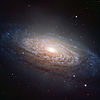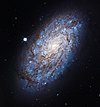|
Flocculent spiral galaxy
 A flocculent spiral galaxy is a type of spiral galaxy. Unlike the well-defined spiral architecture of a grand design spiral galaxy, flocculent (meaning "flaky") galaxies are patchy, with discontinuous spiral arms.[1][2] Self-propagating star formation is the apparent explanation for the structure of flocculent spirals.[3] Approximately 30% of spirals are flocculent, 10% are grand design, and the rest are referred to as "multi-armed".[4] The multiple-arm type is sometimes grouped into the flocculent category.[5] The prototypical flocculent spiral is NGC 2841.[6] List of flocculent spiral galaxies
References
Sources
External linksLook up flocculent spiral galaxy in Wiktionary, the free dictionary.
|








